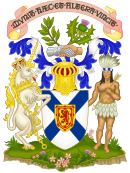
Sir Charles Tupper, 1st Baronet,, M.D. was a Canadian Father of Confederation who served as the sixth prime minister of Canada from May 1 to July 8, 1896. As the premier of Nova Scotia from 1864 to 1867, he led Nova Scotia into Confederation. He briefly served as the Canadian prime minister, from seven days after parliament had been dissolved, until he resigned on July 8, 1896, following his party's loss in the 1896 Canadian federal election. He is the only medical doctor to have ever held the office of prime minister of Canada and his 68-day tenure as prime minister is the shortest in Canadian history.
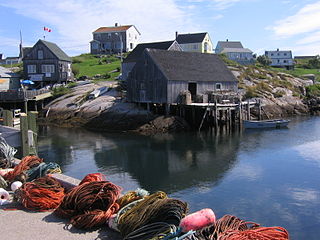
The Maritimes, also called the Maritime provinces, is a region of Eastern Canada consisting of three provinces: New Brunswick, Nova Scotia, and Prince Edward Island. The Maritimes had a population of 1,899,324 in 2021, which makes up 5.1% of Canada's population. Together with Canada's easternmost province, Newfoundland and Labrador, the Maritime provinces make up the region of Atlantic Canada.

Canadian Confederation was the process by which three British North American provinces—the Province of Canada, Nova Scotia, and New Brunswick—were united into one federation called the Dominion of Canada, on July 1, 1867. Upon Confederation, Canada consisted of four provinces: Ontario and Quebec, which had been split out from the Province of Canada, and the provinces of Nova Scotia and New Brunswick. Over the years since Confederation, Canada has seen numerous territorial changes and expansions, resulting in the current number of ten provinces and three territories.

Sir Adams George Archibald was a Canadian lawyer and politician, and a Father of Confederation. He was based in Nova Scotia for most of his career, though he also served as first Lieutenant Governor of Manitoba from 1870 to 1872.

The 1867 Canadian federal election was held from August 7 to September 20, 1867, and was the first election for the new country of Canada. It was held to elect members representing electoral districts in the provinces of Nova Scotia, New Brunswick, Ontario and Quebec to the House of Commons of the 1st Canadian Parliament. The provinces of Manitoba (1870) and British Columbia (1871) were created during the term of the 1st Parliament of Canada and were not part of this election.

Joseph Howe was a Nova Scotian journalist, politician, public servant, and poet. Howe is often ranked as one of Nova Scotia's most admired politicians and his considerable skills as a journalist and writer have made him a provincial legend.

The Nova Scotia New Democratic Party is a social-democratic, progressive provincial party in Nova Scotia, Canada. It is the provincial entity of the federal New Democratic Party (NDP). It was founded as the Co-operative Commonwealth Federation (CCF) in 1932, and became the New Democratic Party in 1961. It became the governing party of Nova Scotia following the 2009 Nova Scotia election, winning 31 seats in the Legislature, under the leadership of Premier Darrell Dexter. It is the first New Democratic Party in Atlantic Canada to form a government, and the second to form a government in a province east of Manitoba. The party lost government at the 2013 election, losing 24 seats, including Dexter's seat. Gary Burrill, the party’s leader from 2016 to 2022, is credited with bringing the party back to its left-wing roots. The party currently holds six seats in the Legislature and has been led by Claudia Chender since June 2022.

Anti-Confederation was the name used in what is now the Maritimes by several parties opposed to Canadian Confederation. The Anti-Confederation parties were accordingly opposed by the Confederation Party, that is, the Conservative and Liberal-Conservative parties.
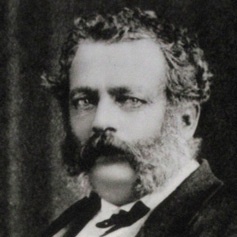
Hiram Blanchard was a Nova Scotia lawyer, politician, and the first premier of Nova Scotia. Blanchard won election to the Nova Scotia legislative assembly in Inverness in 1859 as a Liberal.
Confederation Party was a term for the parties supporting Canadian confederation in the British colonies of New Brunswick, Nova Scotia, and Newfoundland in the 1860s when politics became polarized between supporters and opponents of Confederation. The Confederation parties were accordingly opposed by Anti-Confederation parties in those three jurisdictions. A conference was held on September 1, 1864, in Charlottetown when the Province of Canada became interested in it. John A. Macdonald was a huge promoter of Confederation and even made an alliance with his political rival, George Brown to make it happen.

The Nova Scotia Liberal Party is a centrist provincial political party in Nova Scotia, Canada and the provincial section of the Liberal Party of Canada. The party currently forms the Official Opposition in Nova Scotia, under the leadership of Zach Churchill. The party was in power most recently from the 2013 election until the 2021 election.

The Progressive Conservative Association of Nova Scotia, is a moderate political party in Nova Scotia, Canada. Like most conservative parties in Atlantic Canada, it has been historically associated with the Red Tory faction of Canadian conservatism. The party is currently led by Pictou East MLA Tim Houston. The party won a majority government in the 2021 provincial election. The Progressive Conservative Party of Nova Scotia and the Conservative Party of Canada are two separate entities.
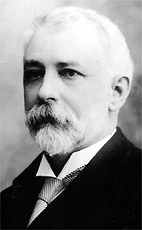
William Stevens Fielding, was a Canadian Liberal politician, the seventh premier of Nova Scotia (1884–96), and the federal Minister of Finance from 1896 to 1911 and again from 1921 to 1925.
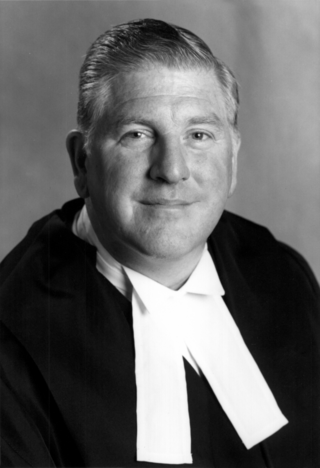
Paul MacEwan was a politician from Cape Breton Island, Nova Scotia, Canada. His 33 years in the Nova Scotia House of Assembly made him the longest constinuous serving Member of the Legislative Assembly (MLA) in Nova Scotia history. He was a contentious politician, who seemed to court controversy. So much so, he was kicked out of the Nova Scotia New Democratic Party (NDP) while he was a sitting member of the assembly in 1980 and caused them to lose official party status without him. He formed his own political party, the Cape Breton Labour Party, to contest the 1984 provincial election. He served one-term as its leader, before the party disintegrated because of financial issues. He eventually joined the Liberal Party of Nova Scotia, and became a Liberal member of the legislature. In 1993, he became the Speaker of the House of Assembly. His term as the speaker was marked with many controversies around bias and partisanship. His final years in the legislature saw him take prominent roles as Party Whip for the Liberals. After several health issues, he decided to not run for office again in 2003. He retired and lived another 14 years before finally succumbing to health issues in 2017, at age 74 in Sydney.
The 1867 Nova Scotia general election was held on 18 September 1867 to elect members of the 24th House of Assembly of the Province of Nova Scotia, Canada. It was the first general election in Nova Scotia after Confederation, and was won by the Anti-Confederation Party.
Donald MacDonald was a Canadian social democratic politician and trade unionist who led the Nova Scotia Co-operative Commonwealth Federation and was elected as a member of the Nova Scotia House of Assembly in 1941. In 1968 he was elected President of the Canadian Labour Congress (CLC).
The Government of Nova Scotia is the government of the Canadian province of Nova Scotia. The powers and structure of the province are set out in the Constitution Act, 1867. In modern Canadian use, the term "government" refers broadly to the cabinet of the day chosen from the Nova Scotia House of Assembly and the non-political staff within each provincial department or agency – that is, the civil service.

William Dawson Lawrence was a successful shipbuilder, businessman and politician. He built the William D. Lawrence, which is reported to be the largest wooden ship ever built in Canada.
